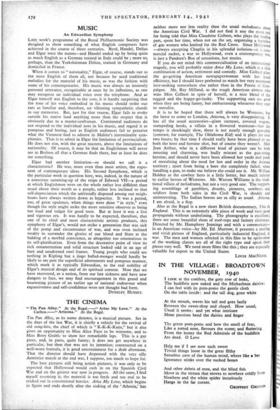THE CINEMA
Tin Pan Alley." At the Regal.—" Arise My Love." At the Carlton.—" Arizona." At the Regal.
Tin Pan Alley, as its name denotes, is a musical picture. Set in the days of the last War, it is chiefly a vehicle for the revival of old song-hits, the chief of which is " K-K-K-Katie," but it also gives an opportunity to Miss Alice Faye to be winsome, and to Miss Betty Grable to show her remarkable legs. This is a gay piece, and, in parts, quite funny; it does not get anywhere in particular, but then that was not its intention; constructed on a well-worn formula, it is good entertainment for a drab afternoon. That the director should have dispensed with the very silly Armistice march at the end was, I suppose, too much to hope for.
The best pictures still being action pictures, it was only to be expected that Hollywood would cash in on the Spanish Civil War and on the greater war now in progress. All the same, I find myself resenting it; the material is too fresh and too real to be tricked out in conventional heroics. Arise My Love, which begins in Spain and ends shortly after the sinking of the Athenia,' has neither more nor less reality than the usual melodrama about the American Civil War. I did not find it any the more real for being told that Miss Claudette Colbert, who plays the leading part, spent her time, when not on the set, organising a battalion of 400 women who knitted for the Red Cross. Since Hollywood —always excepting Chaplin in his splendid isolation—is a com- mercial racket, a war to Hollywood, even a contemporary war, is just a Pandora's Box of sensations, hot stories.
If you do not mind this commercialisation of an international tragedy, you will probably enjoy Arise My Love, which is a slick combination of action, sentiment and comedy. Miss Colbert plays the go-getting American newspaperwoman with her usual efficiency, but I should have preferred to watch her very mannered love-making somewhere else rather than in the Forest of Com- piegne. Mr. Ray Milland, as the tough American airman who wins Miss Colbert in spite of herself, is a nice blend of the rugged and the happy-go-lucky. The supporting cast are good when they are being funny, but embarrassing whenever they start to moralise.
ft is to be hoped that there will always be Westerns, but the latest to come to London, Arizona, is very disappointing. It has all the usual accessories—giant cactuses, covered wagons, stampeding herds, a villain in a flowered waistcoat—but the tempo is shockingly slow, there is not nearly enough gun-play (contrast, for example, The Oklahoma Kid) and it plays for over two hours; by that time I should really have been pleased to see both the hero and heroine shot, but of course they weren't. Miss Jean Arthur, who in a different kind of picture can be both amusing and charming, was badly miscast as the gun-toting heroine, and should never have been allowed her yards and yards of moralising about the need for law and order in the Arizona territory ; apart from being a bore she completely failed, when handling a gun, to make me believe she could use it. Mr. William Holden as the cowboy hero is a little better, but much inferior to earlier heroes of Westerns. Mr. Warren Williams is the tradi- tional villain of melodrama, but not a very good one. The support- ing assemblage of gamblers, drunks, pioneers, cowboys and soldiers from both sides in the Civil War, is shoddy and uninteresting. The Indian braves are as silly as usual. Arizona, I am afraid, is a flop.
Also at the Regal is a new short British documentary, This Is England. This is an extremely able piece of work and very good propaganda without underlining. The photography is excellent ; there are some beautiful shots of roof-tops and factory chimneys. Directed by Mr. Humphrey Jennings and with a commentary— in an American voice—by Mr. Ed. Murrow, it presents a moving and vivid picture of England, particularly industrial England, at war. The men and women selected in this film to be spokesmen of the working classes are all of the right type and speak their pieces very well. We need more films like this ; they are especially valuable for export to the United States.
LOUIS MACNEICE.






























 Previous page
Previous page